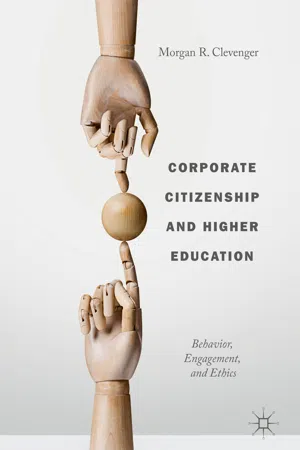Life within higher education has sometimes been referred to as ‘the ivory tower’ with concerns that colleges and universities are purposefully removed from the rest of society. In contrast, the business world is often perceived as driven by ‘the almighty dollar’ without conscience or intent to serve humankind. What would motivate someone in the cloistered world of academia to develop a relationship with a business partner? Why would people at a university want to interact with people at a corporation? Vice versa, what would compel a corporate leader to develop a long-term relationship with a university? And when those relationships become well established, how can we research and better understand them? As groups of people combine based on interests and missions, organizations are formed. In the larger society, organizations—and all the individuals who collectively compose them—also interact and have relationships. Thus, the complexities of inter-organizational behavior are manifested. Two specific types of organizations are explored in this book: higher education and American business.
The discussion for this book is based on a 2014 dissertation framed as a qualitative organizational analysis case study focused on the inter-organizational relationship between higher education and corporate America’s behavior (Clevenger, 2014). This work should be considered a research report. It accounts for important and first-of-a-kind documentation of such findings. It provides a plethora of discussion as well as relevant future ideas for expanded investigation to be done. Cone’s (2010) corporate citizenship spectrum is used as the lens to view these inter-organizational relationships. This model has not previously been used for research purposes, so this work is instrumental in nature. Three key research questions are used to explore this relationship. Research question one: Why does a higher education institution accept corporate citizenship engagement and financial support? Research question two: Why do U.S. corporations engage as corporate citizens in relationships with a higher education institution? Research question three: What ethical concerns arise in the engaged inter-organizational relationship between corporations and a higher education institution? The dissertation study, An Organizational Analysis of the Inter-organizational Relationships Between a Public American Higher Education University and Six United States Corporate Supporters: An Instrumental, Ethnographic Case Study Using Cone’s Corporate Citizenship Spectrum, is available via Pro Quest or at the University of Missouri-Columbia at https://mospace.umsystem.edu/xmlui/handle/10355/45866 (Clevenger, 2014).
Many scholars have noted the importance of organizations in society but the lack of research available related to this specific topic (e.g., Ring & Van de Ven, 1994; Thompson, 2005; Walsh, Weber, & Margolis, 2003), thus the importance of and need for this study. Siegel (2008) said “the particular configuration of universities, corporations, government agencies, and non-profits has not been studied in depth” (p. 224). While many people have hunches or gut feelings about how corporations and higher education interact, this work is the first organized and recorded work documenting the inter-organizational behaviors. Wokutch, Steiner, Waddock, and Mallott (2018) recall the past 25 years of social issues and the growth of this field in Oral Histories of the Business and Society/SIM Field and the SIM Division of the Academy of Management: Origin Stories from the Founders. While business ethics has been ingrained in college and university curricula since the 1890s, studies of business and corporate behaviors have been important and focused on how companies behave in general. More actions and research are needed in the field. One of the greatest strengths in the field of social management is also a great weakness: diversity of multidisciplinary fields contributing to the complexity of the topic of corporate social responsibility including, business administration, economics, law, leadership, management, strategy, theology, philosophy, and many others.
This chapter explores the importance of Clevenger’s (2014) work, the background of the need of this research, inter-organizational behavior, a brief introduction of Cone’s (2010) corporate citizenship spectrum that was used as the lens and framework of the project, and an overview of key themes in the findings, which will be expounded and discussed in the remaining chapters.
Background of a Pluralistic Society and Key Sectors
The United States of America is a pluralistic society through a multitude of groups and organizations that coexist to provide diffusion of power among them, wide decentralization, and diversity. Virtues of a pluralistic society include preventing power from being concentrated in the hands of a few, maximizing freedom of expression and balance, minimizing the danger of any one leader or organization being in control, and providing built-in checks and balances. America’s pluralistic environment requires all parties to take interest, ownership, and responsibility for rational behavior and joint ownership for social values (Jacoby, 1973; Saul, 2011).
Three key entities that share a dynamic relationship in this plural...
